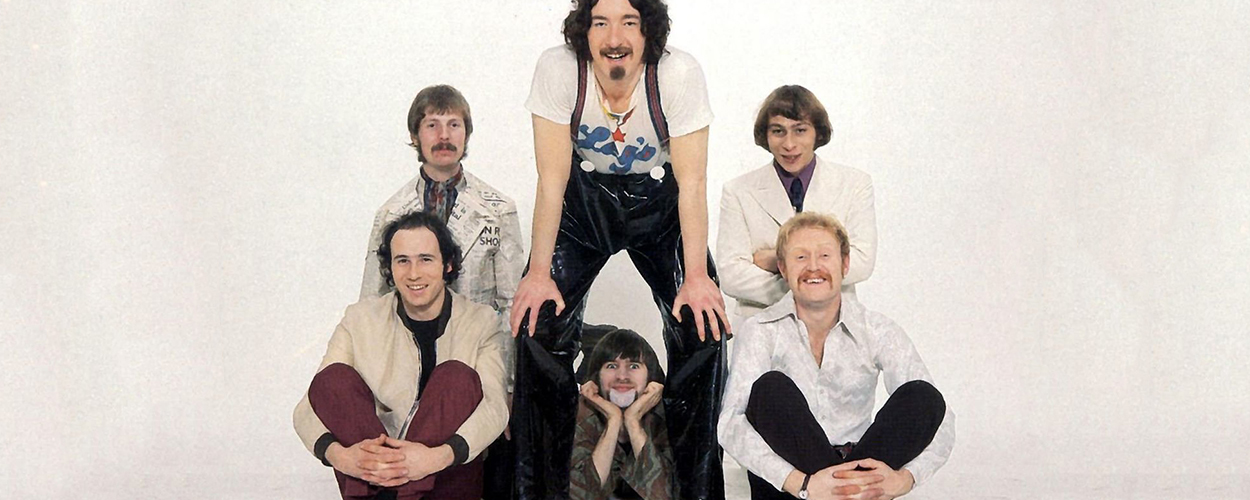This website uses cookies so that we can provide you with the best user experience possible. Cookie information is stored in your browser and performs functions such as recognising you when you return to our website and helping our team to understand which sections of the website you find most interesting and useful.
Artist News Business News Legal
Bonzo Dog Doo-Dah Band want change in the law after winning “emotionally charged” trademark dispute
By Chris Cooke | Published on Thursday 16 April 2020

The surviving members of the Bonzo Dog Doo-Dah Band have said that they will work with MPs and the Intellectual Property Office to close what they see as a loophole in UK trademark law that can result in bands losing control of their brands.
That commitment comes at the end of a long-drawn out legal battle with film and documentary-maker Robert Carruthers, who had worked with the band on various shows and projects since 2005.
His company Anglo Atlantic Media had registered the band’s logo as a trademark in 2015. This application was initially accepted by the trademark registry, but the band subsequently sought to have it invalidated, arguing that they had not been aware of the registration and that Carruthers had registered the mark in bad faith.
The band’s ultimately successful bid to have the trademark invalidated resulted in plenty of lively back and forth, with the IPO official who oversaw the dispute noting that it had been “hard fought in an often emotionally charged manner”.
Concluding that the trademark had indeed been registered in bad faith, an IPO ruling last year stated: “Unless there is an agreement to the contrary (which I have found there was not), or unless the band is created by a record company (which it was not), persons or businesses who engage with a band in the way that [Anglo Atlantic Media and Carruthers] has, should not be registering trademarks the effect of which would be to put them in complete control of the name of the band they represent and which would have the potential effect of preventing the band from undertaking the activities it should be free to do under its own name”.
While noting that Carruthers had invested both time and money into the band through the various projects they’d worked on together, the ruling went on: “Honest people in the trade observing acceptable standards of behaviour would do so by relying on the remuneration from such activities to recoup their investment. If they were concerned about not gaining sufficient remuneration then some form of exclusive representation agreement should have been agreed. The use of the trademark system is not the correct mechanism for the protection they seek, even if Mr Carruthers designed the figurative elements of the mark”.
But the dispute didn’t stop there. In addition to the back and forth at the IPO, Anglo Atlantic Media also took the matter to the High Court. The company filed lengthy complaints about the conduct of the band during the trademark dispute and over various statements that had been made by band members and their supporters as part of and in relation to the IPO hearings.
Anglo Atlantic Media’s legal filings variously accused the band and others of unlawfully conspiring to publish malicious falsehoods, misrepresenting their right to the name and infringing the company’s trademark.
However, earlier this month the High Court concluded that those legal claims were “totally without merit” and that Anglo Atlantic Media’s filings to the court had been “incomplete” but, somewhat ironically, at the same time “prolix” – or “tediously lengthy” to give the word its dictionary definition.
The judge also noted that “the overall impression one gets from the witness statements is that Mr Carruthers is on a mission to defeat the band and raises every point he can think of, regardless of relevance, to achieve his aim”.
Welcoming the ruling, the band’s Larry Smith said he and his bandmates had “suffered monstrous threats, lies and claims that should never have been issued and then allowed to be processed in the first place”.
Fellow band member Rodney Slater added that while he felt “victorious” he nevertheless carries “the scars of two years of tactical, vexatious litigation from legitimately defending what was mine”. He cautioned other artists “don’t try this at home until the law is reformed”.
One of the band’s witnesses in the IPO proceedings, who then found himself caught up in the subsequent High Court action, was Richard Allen, who remarked of the whole experience: “Finding yourself being sued for fabricated nonsense by someone you have never met or spoken to is incredible enough, but I find it even more startling that the claims being made against me were based entirely on my witness statement for an IPO hearing”.
“This is a case where someone weaponised the legal system to intimidate a witness with impunity”, he added. “Nobody protected me and that cannot be right”.
With all that in mind, the band said in a joint statement this week that, “with the assistance of Kerry McCarthy MP and The Musicians’ Union, [we] now intend to assist the IPO and Parliament in closing a loophole that allows anyone to appropriate a band’s name by paying a £200 fee without having to provide adequate proof of ownership. Similarly, [we] wish to see more safeguards for witnesses so that they are not subjected to intimidation via the courts”.





